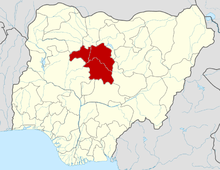Zangon Kataf
Zangon Kataf is a Local Government Area in southern Kaduna State, Nigeria. Its headquarters is in the town of Zonkwa. It is also a name of a town in the chiefdom of the Atyap. It has an area of 2,668 km² and a population of 318,991 at the 2006 census. The postal code of the area is 802.[2]
Zangon Kataf MABA̱TA̱DO | |
|---|---|
LGA and Town | |
| Country | |
| State | Kaduna State |
| Government | |
| • Type | Democracy |
| • Chairman | Dr. Elias Manza[1] |
| Area | |
| • Total | 1,030 sq mi (2,668 km2) |
| Population (2006) | |
| • Total | 318,991 |
| 2006 National Census | |
| Time zone | UTC+1 (WAT) |
Boundaries
Zangon Kataf Local Government Area shares boundaries with Kachia Local Government Area to the west, Kajuru Local Government Area to the northwest, Kauru Local Government Area to the north and northeast, Kaura Local Government Area to the southeast, Jema'a Local Government Area to the south and Jaba Local Government Area to southwest respectively.[3][4]
Admistrative subdivisions
The Local Government Area is divided into the following administrative subdivides or electoral wards:
- Gidan Jatau
- Gora (Ka̠nai)
- Ikulu (Bakulu)
- Kamantan (Anghan)
- Madakiya (Bata̠don)
- Unguwar Rimi (Za̠nta̠rakpat)
- Unguwar Gaya (A̠tak Njei)
- Zaman Dabo (A̠tak Nfang)
- Zango Urban (Maba̠ta̠do)
- Zonkwa
- Zonzon
Population
Zangon Kataf (Maba̠ta̠do) Local Government Area according to the March 21, 2006 national population census was put at 318,991. Its population was projected by the National Population Commission of Nigeria and National Bureau of Statistics to be 430,600 by March 21, 2016.
People
The people predominantly belong to the Atyap (Nienzit) Ethno-Linguistic group. These people include: the Bajju, Atyap proper, Bakulu, Anghan and A̱tyeca̠rak. There are also the Hausa settler elements and other Nigerian peoples settling among the aboriginal people.
Traditional states
There are four chiefdoms in the Local Government Area, namely:
1. Bajju chiefdom, headed by the A̱gwam Ba̱jju, A̱gwam Nuhu Bature A̱chi. Headquarters at Zonkwa.
2. Atyap chiefdom, headed by the A̱gwatyap (A̱gwam A̱tyap), A̱gwam Dominic Gambo (KSM). Headquarters at A̠tak Njei, Zangon Kataf (Maba̠ta̠do).
3. Akulu chiefdom, headed by the Agwom Akulu, Agwom Yohanna Sidi Kukah. Headquarters at Kumuru.
4. Anghan chiefdom, headed by Ngbia Anghan, Ngbia Adam Alkali. Headquarters at Fadan Kamantan.
Language
The five indigenous people found in the Local Government Area speak related dialects of a common language, Tyap. The largest of them is Jju, closely followed by Tyap proper, then by Kulu, then by Nghan and then by Tyeca̱rak. However, due to the British colonial influence, Hausa language is also widely spoken.
Cuisine
The major cultural delicacies enjoyed by the people of Zangon Kataf include:
- Ka̱ti/Kpukpei (a semi-liquid food made from coarse corn flour and vegetables)
The main non-alcoholic drinks synonymous with this region is known as ta̱bwai in the Tyap tongue (kunu in Hausa).
The region has also for long been synonymous for the brewing of the alcoholic drink known as a̱kan in Tyap proper and Tyeca̠rak, dikan in Jju and burukutu in Hausa, although its brewing has been banned in some areas.
Notable people
- Rachel Bakam, entertainer
- Ishaya Bakut, military service
- Isaiah Balat, politician
- Musa Bityong, military service
- Harrison Bungwon, engineer, paramount ruler
- Bala Ade Dauke, politician, paramount ruler
- Sunday Marshall Katung, lawyer, politician
- Rev. Fr. Matthew Hassan Kukah, clergy
- Zamani Lekwot, military service
- Blessing Liman, military service
- Kyuka Lilymjok, lawyer, writer
- Ishaya Shekari, military service
- Dominic Yahaya, paramount ruler
- Andrew Yakubu, engineer
References
- "Zango Kataf Council Chairman Thanks el-Rufai, Anticipates Exciting Tenure". NewNigerianNewsPapers. May 24, 2018. Retrieved August 1, 2020.
- "Post Offices- with map of LGA". NIPOST. Archived from the original on October 7, 2009. Retrieved 2009-10-20.
- "Latest violence in Southern Kaduna Longest on record - Report". Premium Times Nigeria. February 12, 2017. Retrieved August 1, 2020.
- "Kaduna-State-Political-Map". VON. Retrieved August 7, 2020.
- "Zangon Kataf Sub divisions". mindat.org. Retrieved July 31, 2020.
- James, Ibrahim (2000). The Settler Phenomenon in the Middle Belt and Problems of National Intergration in Nigeria.
